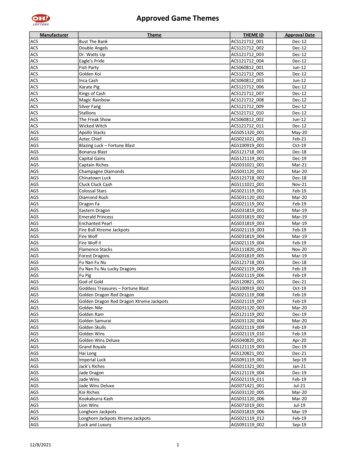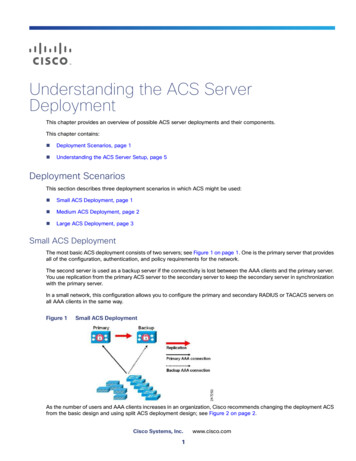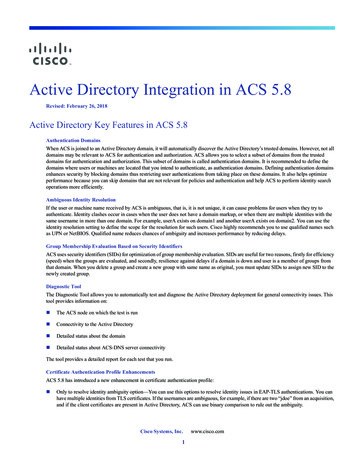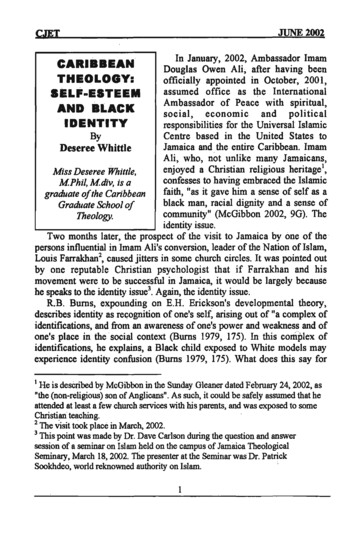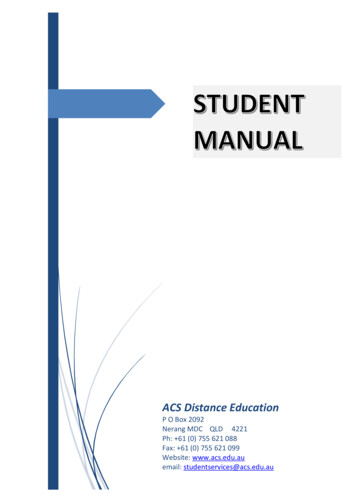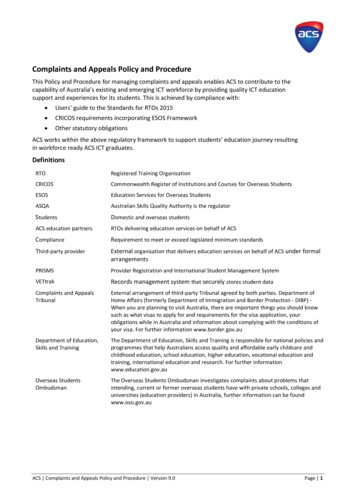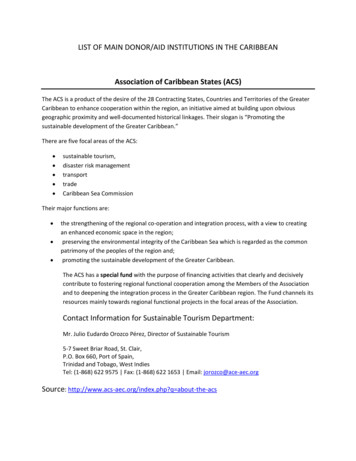
Transcription
LIST OF MAIN DONOR/AID INSTITUTIONS IN THE CARIBBEANAssociation of Caribbean States (ACS)The ACS is a product of the desire of the 28 Contracting States, Countries and Territories of the GreaterCaribbean to enhance cooperation within the region, an initiative aimed at building upon obviousgeographic proximity and well-documented historical linkages. Their slogan is “Promoting thesustainable development of the Greater Caribbean.”There are five focal areas of the ACS: sustainable tourism,disaster risk managementtransporttradeCaribbean Sea CommissionTheir major functions are: the strengthening of the regional co-operation and integration process, with a view to creatingan enhanced economic space in the region;preserving the environmental integrity of the Caribbean Sea which is regarded as the commonpatrimony of the peoples of the region and;promoting the sustainable development of the Greater Caribbean.The ACS has a special fund with the purpose of financing activities that clearly and decisivelycontribute to fostering regional functional cooperation among the Members of the Associationand to deepening the integration process in the Greater Caribbean region. The Fund channels itsresources mainly towards regional functional projects in the focal areas of the Association.Contact Information for Sustainable Tourism Department:Mr. Julio Eudardo Orozco Pérez, Director of Sustainable Tourism5-7 Sweet Briar Road, St. Clair,P.O. Box 660, Port of Spain,Trinidad and Tobago, West IndiesTel: (1-868) 622 9575 Fax: (1-868) 622 1653 Email: jorozco@ace-aec.orgSource: http://www.acs-aec.org/index.php?q about-the-acs
Australian Aid (AusAID)Australia Aid or AusAID provides advice and support to the Minister for Foreign Affairs on developmentpolicy, and plans and coordinates poverty reduction activities in partnership with developing countries.Their main purpose is to help countries out of poverty, in conjunction with other global partners ifnecessary. As it relates to the Caribbean, AusAID focuses primarily on poverty alleviation, especially inHaiti, and on the provision of aid in the aftermath of natural disasters.Aid that may be of particular interest to CTO members covered under AusAID would include: education,the environmentregional stabilityscholarshipsSources: a/Pages/default.aspxContact InformationHead office addressR.G. Casey BuildingJohn McEwen CrescentBarton ACT 0221AustraliaHead office contact numbersSwitchboard: 61 2 6261 1111Fax: 61 2 6261 3111
Caribbean Development Bank (CDB)The CDB is a multilateral financial institution dedicated to the development of the economies of itsBorrowing Member Countries. CDB provides assistance to governments, public sector enterprises andnon-governmental organizations.One of the main goals of the Caribbean Development Bank (CDB) is to be the leading catalyst fordevelopment resources into the region, working in an efficient, responsive and collaborative mannerwith other development partners. One of the main functions of the bank is to promote private andpublic investment and to facilitate business activity and expansion.The main programmatic areas are: Special Development FundooCaribbean Technological Consultancy Services (CTCS)Disasters and Climate Change Basic Needs Trust FundoooEnvironment, Disaster and Climate ChangeGender EqualityPoverty Reduction Action Plan (PRAP)oCommunity Disaster Risk Reduction Fund VYBZING: CDB and YouthThe Private Sector Development Unit (PSDU) of the Caribbean Development Bank:This unit was established with the objective of broadening the scope of development assistance to itsBMC’s.CDB provides financial assistance to private enterprises and financial intermediaries as well as to publicsector financial intermediaries which satisfy CDB’s specific investment criteria.The Private Sector Development Unit of the Caribbean Development Bank’s Capacity BuildingProgrammes provides the following types of financing: Micro Enterprise FinancingSmall Enterprise FinancingMedium Enterprise Financing
Contact Information:Caribbean Development BankP.O. Box 408WildeySt. MichaelBarbados, W.I.Tel: (1-246) 431-1600Fax: (1-246) 426-7269Email:info@caribank.orgSources: nk.org/about-cdb/contact-us
Commonwealth SecretariatThe Commonwealth organizations are involved in several activities such as building the small businesssector. The organization helps member countries take advantage of opportunities for economic growthand improve their ability to manage long-term development. It also provides cost-effective assistanceand policy analysis and advice, especially to small states. The uniqueness of the Commonwealth is thefact that the policies are shaped by member countries that all have an equal say on decisions that affectthem.Commonwealth organisations are involved in diverse activities, from helping countries with tradenegotiations to encouraging women’s leadership, building the small business sector, supporting youthparticipation at all levels of society and providing experts to write laws.The Commonwealth Secretariat promotes democracy, rule of law, human rights, good governance andsocial and economic development. We are a voice for small states and a champion for youthempowerment.The Commonwealth Fund for Technical Co-operation (CFTC) was setup in 1971 and is the principalmeans for the Commonwealth Secretariat to provide technical assistance to Commonwealth countries.Our approach emphasises country ownership by delivering technical assistance on a demand-drivenbasis.The three goals are:1. Strong democracy, rule of law, promotion and protection of human rights and respect for diversity;2. Inclusive growth and sustainable development; and3. A well-connected and networked Commonwealth.Six strategic outcomes are:1. Democracy – greater adherence to Commonwealth political values and principles;2. Public institutions – more effective, efficient and equitable public governance;3. Social Development – enhanced positive impact of social development;4. Youth – youth more integrated and valued in political and development processes;5. Development: pan-Commonwealth – more effective frameworks for inclusive economic growth andsocial and sustainable development; and6. Development: small states and vulnerable states – strengthened
Contact Information:General enquiriesSmall States Office (Geneva)Commonwealth SecretariatMarlborough HousePall MallLondon SW1Y 5HXUnited KingdomTel: 44 (0) 20 7747 6500Fax: 44 (0) 20 7930 0827Commonwealth Small StatesOffice, Geneva15b Chemin Louis-Dunant(3rd Floor)Geneva 1202SwitzerlandTel: 41 (0) 22 730 1700Fax: 41 (0) 22 730 1717Email: geneva@commonwealth.intSmall States Office (NewYork)The Joint Office forCommonwealth PermanentMissions to the UnitedNations800 Second Avenue, Suite400New York, N.Y.10017United States of AmericaTel: 1 (212) 599 6190Fax: 1 (212) 972 3970Email: newyork@commonwealth.intSources: nwealth.org/our-work/economic-developmentThe Commonwealth of Learning (A Commonwealth Secretariat Institution)Through its own resources and its extensive networks, the Commonwealth of Learning (COL) provides awealth of services and collaborative opportunities for policy makers, institutions and distance educationpractitioners to encourage the development of, and help enhance, the use of open and distance learning(ODL) policies, systems and applications.COL’s mission is to help governments expand the scale, efficiency and quality of learning by usingappropriate technologies, particularly those that support “open and distance learning” (ODL). Theapplication of technology through ODL techniques has shown its power and value in many countries andfor many purposes.Contact InformationCommonwealth of Learning (COL)1055 West Hastings Street, Suite 1200Vancouver, BC V6E 2E9CanadaTel: 1.604.775.8200Fax: 1.604.775.8210E-mail: info@col.orgWeb: www.col.org 1.604.775.8200Staff contact information is available at www.col.org/staff
Department of International Development of the UK (DFID)The Department for International Development (DFID) leads the UK’s work to end extreme poverty.They are ending the need for aid by creating jobs, unlocking the potential of girls and women andhelping to save lives when humanitarian emergencies hit.In the Caribbean DFID works to reduce the region's vulnerability to economic shocks, high levels ofviolent and organised crime, natural disasters and climate change.DFID’s regional programme to the Caribbean amounts to 75 million for the period 2011- 2015 and aimsto: create 10,000 new jobs, 50% of them for womenincrease the number of people living in Jamaica who trust and have confidence in the police by11%enable 228,000 people in coastal communities, including small farmers, to better cope with theeffects of climate change and natural disastersincrease the average score of Caribbean countries in the World Bank ‘Ease of Doing BusinessIndex’ by 20%empower communities to demand better services and greater accountability from decisionmakersThe DFID Caribbean regional office is based in Barbados. DFID staff is also based in Jamaica and Guyana.Contact Information:DFID CaribbeanBritish High CommissionLower Collymore RockSt. MichaelBB11000BarbadosEmailenquiry@dfid.gov.ukTel: 1 (246) 430-7900Fax : 1 (246) 430-7959 1 (246) 430-7900DFID Caribbean (Jamaica)British High CommissionPO Box 57528 Trafalgar RoadKingston 10JamaicaEmailenquiry@dfid.gov.ukTel: 1 876 936 0700Fax: 1 876 733 5336 1 876 936 0700
DFID Caribbean (Guyana)British High Commission44 Main Street StreetGeorgetownGuyanaEmailenquiry@dfid.gov.ukTel: 592 226 5883Fax: 592 226-3360 592 226 5883/4Source: ment-for-internationaldevelopment/about
European Union (EU)OECS: The OECS works along with a number of regional agencies and institutions. These include theCaribbean Community (CARICOM) Secretariat and the Caribbean Development Bank. The OECS iscurrently benefitting from the EU's 165 allocation to CARICOM under the 10th EDF, which is allocatedto strengthening integration within the sub-grouping.CARICOM Member States: At regional level, the Caribbean is pioneer in signing, in October 2008, theEconomic Partnership Agreement (EPA), between the Caribbean Forum (CARIFORUM countries) and theEU, a framework to help make trade, investment and development assistance easier for all parties, inparticular promoting regional integration.In November 2012 the member states of the EU and the Caribbean adopted the new Joint CaribbeanEuropean Union Partnership Strategy. This Strategy will enhance Caribbean– European Union relationsand broaden the engagement by adding a political pillar to the traditionally development and tradecooperation based relationship with the Caribbean region. The strategy focuses on Regional Integration,Haiti Reconstruction, Climate Change and Natural Disasters, Crime and Security, and Joint Action inMultilateral Fora.11th European Development Fund (EDF):In November 2012 the member states of the EU and the Caribbean adopted the new Joint CaribbeanEuropean Union Partnership Strategy. CARIFORUM and the EU have agreed that the Joint Caribbean-EUPartnership Strategy would form the basis for programming of the Caribbean Regional IndicativeProgramme under the 11th EDF.Four (4) thematic priorities have been selected, as follows, for the 11th EDF Regional Programme:1.2.3.4.Regional Economic Cooperation and IntegrationClimate Change and Natural DisasterCrime and SecurityCaribbean Investment Facility (CIF)The 11th EDF funding runs from 2014 to 2020 and a total of 350million is forseen for the allocation.National Indicative Programmes (NIPs)There are also national indicative funds allocated to 21 African, Caribbean and Pacific countries underthe 11th European Development Fund for the period 2014-2020, for a total amount of 339 million euro.The list of the 10 CARICOM beneficiary countries are: Antigua and Barbuda, Barbados, Dominica,Grenada, Guyana, Jamaica, St Kitts and Nevis, St Lucia, St Vincent and the Grenadines, Trinidad andTobago.The preparations of a NIP for each of these countries started, defining the strategy and priorities for EUaid in each particular country. These preparations are done in close cooperation with the partner
countries so as to ensure that NIPs support national priorities and reflect the local context.It is foreseen that by early 2015, the remaining NIPs will be finalised and signed. In parallel, work onpreparing concrete projects and programmes has also started in all countries.Contact InformationDelegation of the European Union to Barbados and the Eastern CaribbeanAmbassador, Head of Delegation, Mikael BarfodHastings, Christ ChurchBB15156BridgetownBARBADOSTelephone: 1-246-434-8501Fax: 1-246-427-8687E-mail: delegation-barbados@eeas.europa.euDelegation of the European Union to Guyana, Suriname, Trinidad and Tobago and for the DutchOverseas Countries and TerritoriesAmbassador, Head of Delegation, Robert Kopecky11 Sendall Place, StabroekGeorgetown, P.O. Box 10847GUYANATelephone : 592-226-4004 592-226-4004Fax: 592-226-2615E-mail: Delegation-guyana@eeas.europa.euDelegation of the European Union to Jamaica, Belize, The Bahamas, Turks and Caicos Islands andCayman IslandsAmbassador, Head of Delegation, Paola Amadei8 Olivier Rd. P.O. Box 463Kingston 8JAMAICATelephone: 1-876-924-6333Fax: 1-876-924-6339E-mail: delegation-jamaica@eeas.europa.eu
Foreign Affairs, Trade and Development Canada (DFATD)Foreign Affairs, Trade and Development Canada (DFATD), previously known as CIDA, manages Canada'sdiplomatic and consular relations, to encourage the country's international trade and to lead Canada’sinternational development and humanitarian assistance. This includes: ensuring that Canada's foreign policy reflects true Canadian values and advances Canada'snational interests; strengthening rules-based trading arrangements and expanding free and fair market access atbilateral, regional and global levels; working with a range of partners inside and outside government to achieve increased economicopportunity and enhanced security for Canada and for Canadians at home and abroad; managing Canada's support and resources effectively and accountably to achieve meaningful,sustainable international development and humanitarian results; engaging in policy development in Canada and internationally, enabling Canada's effort torealize its international development and humanitarian objectives.Source: e/index.aspxCanada – Caribbean Community (CARICOM) Trade Agreement NegotiationsCanada is committed to negotiating a modern trade agreement with CARICOM that will take intoaccount differing levels of development, vulnerabilities associated with island states, and trade-relatedcapacity challenges. CARICOM’s Members are: Antigua and Barbuda, The Bahamas, Barbados, Belize,Dominica, Grenada, Guyana, Haiti, Jamaica, Montserrat, Saint Lucia, St. Kitts and Nevis, St. Vincent andthe Grenadines, Suriname, and Trinidad and Tobago.Source: cords-commerciaux/agracc/caricom/info.aspx?lang engDFATD branch in BarbadosStreet Address:The High Commission of Canada, Bridgetown, BarbadosBishop's Court Hill.
Bridgetown, BB 11000BarbadosTel: 1 (246) 629-3550Fax: 1 (246) 629-3622E-Mail: bdgtn-td@international.gc.caWebsite: www.tradecommissioner.gc.ca/bbOther URL: ories/Responsibilities: Barbados, Anguilla, Antigua and Barbuda, British Virgin Islands, Dominica,Grenada, Guadeloupe, Martinique, Montserrat, St. Kitts and Nevis, St. Lucia, St. Maarten, St. Vincent andthe GrenadinesMrs. Tammy BrathwaiteTrade CommissionerGovernment Procurement, Infrastructure, International Financial Institutions, Professional Services,Sustainable Technologies, TourismEmail: bdgtn-td@international.gc.caMrs. Doreen WeekesTrade CommissionerAgriculture and Processed Foods, Fish and Seafood, Infrastructure, Market Access, Wine, Beer andSpiritsEmail: bdgtn-td@international.gc.caMrs. Allison MillerTrade Commissioner AssistantArts and Cultural Industries, Automotive, Chemicals and Plastics, Education, Ocean TechnologiesEmail: allison.miller@international.gc.caMailing Address:P.O. Box 404.Bridgetown, BarbadosSource: -team.jsp?oid 21&cid 622
German Aid Agency (GIZ)The Deutsche Gesellschaft für Internationale Zusammenarbeit Gmbh, commonly known as GIZ,commonly describes itself as innovative, sustainable and effective and offers customized solutions tocomplex challenges. GIZ draws on its extensive expertise on global issues in its work with emergingeconomies. The company operates on behalf of the German Government in fields such as financialmarket stability, economic growth, fair trade, climate change, water and the Millennium DevelopmentGoals.This work involves their full range of services: they advise commissioning parties, bring togetherstakeholders, organise forums, produce studies, design training courses, manage funds and host thesecretariat for important global processes. They provide tried and tested international cooperationsolutions. Since 2000, GIZ has successfully implemented programmes and projects worth almost 2.5billion euros on behalf of international clients.Contact Information:Friedrich-Ebert-Allee 4053113 BonnPhone: 49 228 44 60-0Fax: 49 228 4460-17 66Dag-Hammarskjöld-Weg 1-565760 EschbornPhone: 49 6196 79-0Fax: 49 6196 79-11Any general queries can be emailed to info@giz.de.Dr. Rainer EngelsExecutive Project Manager1st Floor, Baobab TowerWarrens, St. MichaelBARBADOSPhone: 1-246-436-0578Fax: 1-246-436-9999Email: rainer.engels@giz.deSource: http://www.giz.de/en/aboutgiz/profile.html
Inter-American Development Bank (IDB)The IADB supports efforts by Latin America and Caribbean countries to reduce poverty and inequality,and to bring these about in a sustainable, climate-friendly way. Grants and technical assistance are alsooffered. The IADB has developed four sector priorities and these are social policy for equity andproductivity, institutions for growth and social welfare, competitive regional and global internationalintegration and protection of the environment.Funds are also offered in the field of education. Loans have been offered to the tourism sector in theamount of US 2,059,200 between 1961 and 2013. The IADB’s main focus is sustainable tourism,especially tourism that alleviates some citizens out of poverty.Compete CaribbeanHere are some important facts regarding this project which is an initiative promoting competitiveness in15 CARICOM countries in the region through a partnership with the United Kingdom Department forInternational Development and Foreign Affairs, Trade and Development, Canada: Compete Caribbean will provide technical assistance and investment funding to a variety ofactivities aimed at establishing productive development policies, implementing business climatereforms, launching clustering initiatives, and promoting small and medium-sized enterprises(SMEs) throughout the region. The program establishes a US 32.55 million grant facility to support private sector developmentand competitiveness in the Caribbean region. CIDA is contributing a CAN 20 million grant(around 18.70 million) and DFID is providing a 8.656 million grant (approx. 13.85 million).The IDB is also helping these countries to deal with the effects of climate change and providing supportfor environmental sustainability. Several new projects seek to improve disaster risk management andcoastal infrastructure in the Caribbean region as a whole to mitigate the effects of climate change.MIF GrantsThe Multilateral Investment Fund (MIF) grants support small-scale, targeted interventions that pilot newapproaches and act as a catalyst for larger reforms. The MIF, an autonomous fund member of the IDBgroup, is a major source of technical assistance grants for private sector development in Latin Americaand the Caribbean.SOURCE: ts-,6039.html
Contact Information:Tourism PersonnelAdela MoredaTourism Senior Specialistadelam@iadb.orgMercedes VelascoTourism Senior Associatemvelasco@iadb.orgIDB Headquarters1300 New York Avenue, N.W.Washington, D.C. 20577, USATel: (202) 623-1000Fax: (202) 623-3096Barbados Contact Information:Representative: Mr. Joel BranskiAddress:"Hythe" WelchesMaxwell Main RoadBB17068Christ Church, Barbados, W.I.Mailing Address:P.O. Box 402Christ Church, Barbados, W.I.Tel: 1-246-627-8500Fax: 1-246-429-8869Email: IDBBarbados@iadb.orgTrinidad & Tobago Contact Information:Representative : Michelle Cross FentyAddress:17 Alexandra Street, St. ClairPort of Spain, Trinidad, W.I.
Mailing Address :P.O. Box 68Port of Spain, Trinidad, W.I.Telephone : 1-868 - 822-6400Fax : 1-868-622-6047E-mail : IDBTrinidad@iadb.orgJamaica Contact Information:Representative: Therese Turner-JonesAddress:40-46 Knutsford Boulevard6th FloorKingston, JamaicaMailing Address :P.O.Box 429Kingston 10, JamaicaTelephone: ail: IDBJamaica@iadb.orgGuyana Contact Information:Representative: Sophie MakonnenAddress :47-High Street, KingstonGeorgetown, GuyanaMailing Address:Apartado Postal Nº 10867Georgetown, GuyanaTelephone:(592) 225-7951Fax :(592) 225-7138E-mail :IDBGuyana@iadb.orgSource: http://www.iadb.org/en/mici/funding,8161.html#.Ujy u9KkopgSource: #.Ujy9pNKkopg
Japan International Cooperation Agency (JICA)The Minister for Foreign Affairs of Japan and the Ministers responsible for Foreign Affairs of the MemberStates of the Caribbean Community (CARICOM) and other Heads of Delegations met in Tokyo on 2September 2010 and confirmed the steady development of Japan-CARICOM relations based on "A NewFramework for Japan-CARICOM Cooperation for the Twenty-first Century" adopted in 2000. In this light,the Foreign Ministers discussed ways to further deepen cooperative relations under the new internationalcircumstances, and prepared the document "Partnership for Peace, Development and Prosperity betweenJapan and the Member States of the Caribbean Community (CARICOM)", which gives a further direction tofuture Japan-CARICOM relations.The following are agreed areas of cooperation and collaboration:1. Overcoming Vulnerability and Promoting Human SecurityTaking into account the fact that CARICOM Member States are confronted with various challenges arisingfrom their vulnerability in the face of economic globalization and the growing influence of global warming,Japan agreed to support the efforts of CARICOM Member States to promote sustainable development.1-1 Disaster Risk ReductionBased on the commonly held view that disaster risk reduction is crucially important for the stabilization ofnational livelihood and sustainable development, and, considering the fact that Japan has abundantknowledge and experience in this field, CARICOM and Japan affirmed their intention to promotecooperation in this area.1-2 Education and Capacity DevelopmentSupport was reiterated for cooperation in the field of education for the attainment of the educationrelated Millennium Development Goals (MDGs) by the 2015 timeline. Recognizing that the social stability ofCARICOM Member States is indispensable to their sustainable development, it was agreed that there wouldbe cooperation in capacity-building for vulnerable sectors, including youth, women and children, for theenhancement of basic education, with the aim of arresting poverty.1-3 Health and Medical CareThere was agreement to cooperate for the improvement of access to primary health care service, and forthe enhancement of capacity for prevention, health education and treatment of infectious diseases inCARICOM Member States. In this regard, the Foreign Ministers reaffirmed the importance of theircontinued cooperation in respect of combating HIV/AIDS, which is a major challenge for the CARICOM.2. Integration into the Global EconomyTaking into account the importance for each CARICOM Member State, particularly after the globaleconomic crisis, to develop key industries, expand trade and investment and utilize effectively informationand communications technology (ICT) in order to ensure the sustainable development and the integration
into the global economy of the CARICOM economies, the necessity to promote exchange between Japanand CARICOM Member States including the private sector and to strengthen cooperation, particularly inthe following areas was agreed to.2-1 Improvement of Key Industries (Tourism, Fisheries and Agriculture)Recognizing that tourism is the principal industry of CARICOM Member States, it was agreed to promoteexchanges between the countries, including in the private sector, to ensure the continuousdevelopment of tourism.Strengthening the fisheries industry was agreed to as well as close cooperation in the area of sustainabledevelopment, conservation and management of the region's fisheries and marine resources to ensurethat they make contribution to economic and social development. They also emphasized the need tobetter understand the impacts of climate change on the fisheries and marine ecosystem, and implementadaptation and mitigation measures to protect food security and the livelihoods of coastal communitiesof CARICOM Member States.Recognizing the importance of improving agricultural production with the aim of increasing the ratio offood self-sufficiency in CARICOM Member States, it was agreed to maintain cooperation in theagricultural sector.2-2 Promoting Trade and Investment (Promotion of Local Industry)Recognizing that the promotion of local industry contributes to the diversification of the industrialstructure, promotion of regional development and alleviation of income gaps, the two parties agreed thatthey would continue to cooperate in vocational training and other human resource development programsin such areas as marketing, development of manufacturing skills, standards and quality control andentrepreneurship. They noted that the "One Village One Product Movement" could provide a usefuldemonstration of the opportunities and initiatives that could be explored in the CARICOM.2-3 Promoting the Utilization of Information and Communications Technology (ICT)In light of the importance of information and communications technology (ICT) for the development of theCARICOM economies, the two parties agreed to cooperate for effective literacy in, access to and utilizationof information and communications technology (ICT) in CARICOM Member States. To this end, the goal ofuniversal access to broadband connectivity was emphasized.3. Environment and Climate ChangeRecognizing that environmental challenges must be tackled urgently with collaboration at all levels, therewas agreement to cooperate in particular on the following areas.3-1 Climate ChangeCARICOM Member States are particularly vulnerable to the adverse effects of climate change and that theyrequired support from their development partners to address the challenges posed by climate change andits adverse impacts. Recognizing the necessity to take immediate measures against the serious threats
caused by climate change which confront CARICOM Member States, it was affirmed that Japan willenhance its cooperation to CARICOM Member States in their efforts to implement adaptation andmitigation measures promptly and effectively, and in this regard recognized the need of CARICOM MemberStates to access fast start financing.3-2 Conservation of Biological DiversityDiscussed was the importance of conservation of biological diversity, the sustainable use of its componentsand the fair and equitable sharing of the benefits arising out of the utilization of genetic resources inCARICOM Member States, as they are endowed with abundant flora and fauna, and affirmed theircommitment to cooperate for the 10th Conference of the Parties to the Convention on Biological Diversityto be held in Aichi-Nagoya in 2010.3-3 Renewable Energy and Energy-Saving TechnologyTo tackle the climate change challenges and to ensure the sustainable development, there was anagreement to cooperate in the introduction of renewable energy and energy-saving technology aimed atreducing the burden on the environment.3-4 Realization of a Recycling-Based SocietyRecognizing that it is crucial to realize a recycling-based society that keeps harmony between the use ofnatural resources as well as economic activities and natural cycle, there was agreement to cooperate inpromoting reduce, reuse and recycle (3R) in the area of waste management. Further, recognizing theimportance of ensuring clean water for human health, as well as for economic activities and theconservation of ecosystem, there was agreement to cooperate in improving access to safe drinking waterand addressing water pollution.4. Assistance for the Reconstruction of HaitiSolidarity with Haiti, which suffered a catastrophic earthquake on 12 January 2010, was discussed and thetwo parties noted with appreciation the contribution which both Japan and CARICOM Member States hadmade to the emergency relief effort in Haiti, their continued support to satisfy emergency needs and theircommitment to the medium- and long-term reconstruction of Haiti in accordance with the priorities set bythe Government and people of Haiti. The CARICOM applauded the response by Japan to this catastrophe,which included its participation in the United Nations
Caribbean Community (CARICOM) Secretariat and the Caribbean Development Bank. The OECS is currently benefitting from the EU's 165 allocation to CARICOM under the 10th EDF, which is allocated to strengthening integration within the sub-grouping. CARICOM Member States: At regional level, the Caribbean is pioneer in signing, in October 2008, the


